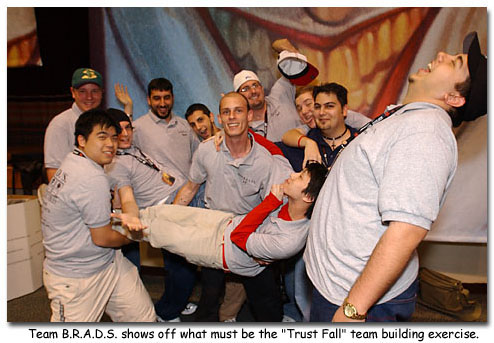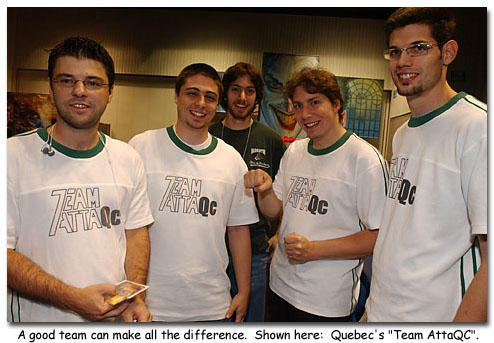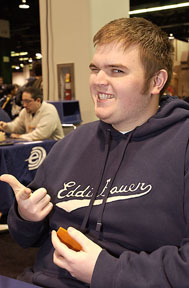
So, I’ve been thinking. Like most of you guys, I was filled with anticipation during the preview weeks. I couldn’t wait to see the next card. I’m a night owl as it is, so I’d pretty much saunter over to my computer (assuming I wasn’t there already) and check Metagame.com as often as needed to get the next day’s card. The new ally mechanic and the dual-team affiliations are really cool and will probably have a great impact on both Sealed Pack and Constructed. They are also the reason I’ve been thinking so much (a rarity for me, I assure you).
It’s kind of strange how things work out sometimes. The Midwest conglomerate descended upon Indianapolis to prepare for the upcoming Pro Circuit as the new Justice League of America set was being previewed on Metagame.com. I thought it was an interesting coincidence that a set with major mechanics so heavily involving teams, affiliations, and helping one another out should be introduced at the same time that this team was in preparation.
Not one to ignore such a coincidence, I decided that I should write an article about teaming up with other players to prepare yourself for a big event. This isn’t a totally new concept, or even one that’s exclusive to this game; throughout gaming history, the best players in a particular region have gathered together to hone their skills. From something as rudimentary as a neighborhood game of basketball to something as exclusive as a meeting of American chess masters, teams are everywhere, and their impact on their respective formats is undeniable.

I guess the best place to begin is to discuss why you’d want to join or start a team. Vs. System is an easy game to learn, but it’s a difficult game to master. Part of what makes it so difficult to master is the fact that there are so many options. As new sets come out and the card base expands, the options continue to grow. This poses a problem for an individual or a small group of people. As the number of options expands, the amount of work that needs to be done to explore all of those options goes up. Each new set brings new cards that may affect the power levels of existing decks or introduce new decks into the format. In order for all of these avenues to be explored fully, you need a large group of players. This is where the team comes into play. Increasing the number of players on a team increases the amount of testing that can be done, and thus the number of avenues that can be explored in a given period of time.
Another important advantage of teaming up with other players is that all players are different. There are many cards out there, and many different opinions about them. One person may outright dismiss a card selection for a deck, while another player might seriously and diligently test it. It’s this difference in opinions that leads to good, extensive testing. If everyone thought the same way, nothing would ever get accomplished. If one player were making a subtle play mistake, no one would be able to catch it. It would be a very poor testing environment. But it’s important to remember that the other extreme is also damaging to a good testing experience. If the players in a testing environment never agree on anything and are immovable in their opinions, it’s very difficult to make proper decisions. Unless the cards, plays, and decks you decided on are the right ones, you won’t have anyone to correct you . . . at least not anyone you would listen to.

So, now you know that it’s important to find a group of people large enough to get all of the things you need to test tested, and diverse enough to bring different viewpoints to the table (but make sure you can still get along!). There’s another important thing to consider when assembling a playtest team—you want to have players who are around your skill level. You ideally want them to be better than you are, but not too much better. It’s important to have a group of players who will all be on the same page strategically. It does no good to playtest if your understanding of the game is at a completely different level than that of your playtest partner. If you or your partner makes a play that the other doesn’t understand, it does no good to either player. Especially because the player who doesn’t understand the play will, in general, be playing at a level that doesn’t accurately represent the outcomes of a particular matchup. You could win every match you play against Curve Sentinels with this new monstrosity you’ve designed, but if your opponent isn’t that familiar with the deck or up to your skill level, it won’t prove anything, because the results from the testing will be skewed.
However, being around better players does serve one major purpose—you get better. You need to be careful about the players with whom you test. You want to play with players who are better than you are, but not so much better that you can’t comprehend what they’re doing. That’s a problem that I’ve had with Other Games™ in the past. I was good, but many of my friends were really good. So good, in fact, that their understanding of the game was out of my reach. It was a fact that took me a while to face; I wasn’t good enough to be playing with them. I eventually managed to find another group of players who were at about the same skill level as me, though two of them were clearly better than I was. I played with them for a while until I was able to hold my own with the better players. During that time, my understanding of the game and its more advanced concepts greatly increased. I eventually went back to playing with my friends from before and was able to hold my own with them, too. All of this was because I managed to find a group near my skill level that could help me raise my game.
 The fact that I didn’t understand something well enough was a very difficult thing for me to admit to myself, so I can only imagine that it would be difficult for many of you, as well. However, as any teacher will tell you, the first step to understanding something is to come to terms with the fact that you don’t understand it. It’s really hard to learn something if you’re closed to the subject. Not everyone who plays a game is a world-class gamer. This concept was first brought to my attention by Gabe Walls, who I do consider to be a world-class gamer. He is good at every game I’ve seen him play that involves cards of any sort. His understanding of the intricacies of these different games is simply astounding. It’s almost as if it comes naturally to him. There are many top-level Vs. System players who don’t fall into the world-class gamer category. It’s like the adage that you can compete with natural skill as long as you have determination, grit, and hard work. All it takes to get better at something is a true desire to improve and the professional diligence to do the work necessary. Having a good support team never hurts, either.
The fact that I didn’t understand something well enough was a very difficult thing for me to admit to myself, so I can only imagine that it would be difficult for many of you, as well. However, as any teacher will tell you, the first step to understanding something is to come to terms with the fact that you don’t understand it. It’s really hard to learn something if you’re closed to the subject. Not everyone who plays a game is a world-class gamer. This concept was first brought to my attention by Gabe Walls, who I do consider to be a world-class gamer. He is good at every game I’ve seen him play that involves cards of any sort. His understanding of the intricacies of these different games is simply astounding. It’s almost as if it comes naturally to him. There are many top-level Vs. System players who don’t fall into the world-class gamer category. It’s like the adage that you can compete with natural skill as long as you have determination, grit, and hard work. All it takes to get better at something is a true desire to improve and the professional diligence to do the work necessary. Having a good support team never hurts, either.
Sorry for that little tangent, but it really gets across my reason for writing. I’m not writing for entertainment, although I do hope to entertain my readers. I am here solely to help all of you raise your game. Vs. System is a difficult game. It’s also relatively easy to qualify for the upper echelon of competition, the Pro Circuit. This can be a dangerous combination, but it can also be a profitable one for a good player. At any given event, there are far more players who are merely average than good. In such a skill-intensive game, a good player can consistently do well. That’s the reason you always see the same names at the top of the leader board at the tournaments; skill ultimately prevails over luck.
It would be foolish to believe that the top players in the game got there by themselves, though. They’re all smart enough to realize that the best way for them to stay on top of their game and prepare for a tournament as large and comprehensive as a Pro Circuit is to group together. FTN, Hong Kong Cavaliers, Realmworx, and RIW Hobbies are just a few of the major teams in existence now. They’re all made of top-level Vs. System players who have put up good finishes and proven themselves. There are also some huge egos crammed into them. And why shouldn’t there be? Almost every member of those teams is a known commodity with the respect of the entire Vs. System community. There must be some reason why all of those egos are put aside when the players work together. The answer is that staying on top of a game this intricate is simply too much work for one person. Take a cue from them and enlist. It can only help you reach the Sunday stage.
Questions and comments can be sent to the_priceis_right@yahoo.com.